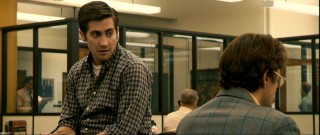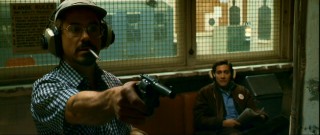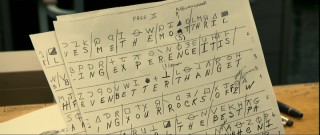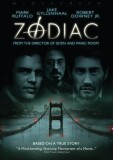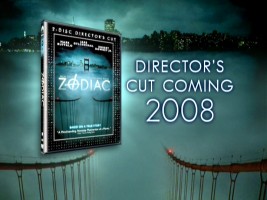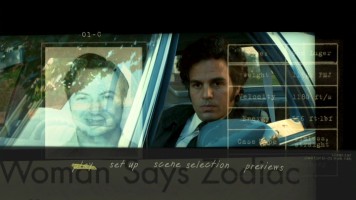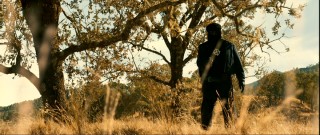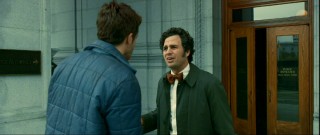Zodiac was rereleased on DVD in January 2008 as a 2-Disc Director's Cut. Click here to read our review.
Zodiac DVD Review
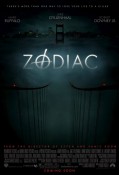 |
Zodiac
Theatrical Release: March 2, 2007 / Running Time: 158 Minutes / Rating: R Director: David Fincher Cast: Jake Gyllenhaal (Robert Graysmith), Mark Ruffalo (Inspector David Toschi), Robert Downey Jr. (Paul Avery), Anthony Edwards (Inspector William Armstrong), Brian Cox (Melvin Belli), Charles Fleischer (Bob Vaughn), Zach Grenier (Mel Nicolai), Philip Baker Hall (Sherwood Morrill), Elias Koteas (Sgt. Jack Mulanax), James Le Gros (Detective George Bawart), Donal Logue (Ken Narlow), John Carroll Lynch (Arthur Leigh Allen), Dermot Mulroney (Captain Marty Lee), Chloë Sevigny (Melanie), John Getz (Templeton Peck), John Terry (Charles Theiriot), Candy Clark (Carol Fisher), June Raphael (Mrs. Toschi), Ciara Hughes (Darlene Ferrin), Lee Norris (Mike Mageau - Young), Ed Setrakian (Al Hyman), Jimmi Simpson (Mike Mageau), Adam Goldberg (Duffy Jennings), Zachary Sauers (Aaron Graysmith, uncredited) |
Buy Zodiac from Amazon.com: Theatrical Cut DVD • 2-Disc Director's Cut DVD • Director's Cut HD DVD
Few crime cases have attracted national attention with as much intensity or for as long as that of the Zodiac Killer. During an eleven month period in 1968 and 1969, the anonymous serial killer who identified himself only as "the Zodiac" murdered at least five innocent and unsuspecting people throughout California. Over the course of the next decade, the killer taunted police and the media with a series of ciphers and letters of confession, never revealing his identity. One candidate stood out, though: Arthur Leigh Allen, a convicted sex offender who topped most investigators' list of likely suspects. Particularly interested in Allen's killing potential was Robert Graysmith, a cartoonist at the San Francisco Chronicle who pieced together the circumstantial case against the accused in two books: Zodiac and Zodiac Unmasked. Nearly forty years after the first murder, the Zodiac case remains open and unsolved to this day.
Hollywood recognized the sensational nature of the crime spree almost immediately. The Zodiac Killer was released in 1971, followed a few months later by Dirty Harry, both based at least in part on the case as it had developed to that point. During the years that have followed, movies, music, television, and books have chronicled the case again and again, ensuring the mystery's place in pop culture.
The most recent account is David Fincher's 2007 film, Zodiac. Adapted from Graysmith's two books, the new telling follows the cartoonist's search for answers, ultimately laying out his conclusions with JFK-like conviction, though Fincher is a bit more even-handed than Oliver Stone. The evidence given for and against the accused is undeniably compelling. The viewers, then, are left the opportunity to decide for themselves.
This enthralling mystery drama strikes its audience as accessible and open to exploration, skillfully achieved through the presentation of multiple viewpoints. Closest to the narrative and the camera is Graysmith (Jake Gyllenhaal) himself, whose interest in the Zodiac moves from passive to obsessive as justice becomes increasingly elusive and his young family increasingly distant. Joining him at the San Francisco Chronicle is Paul Avery (Robert Downey Jr.), the chief reporter in charge of the Zodiac case and the line of communication established between the paper and the killer. Heading the police investigation is Inspector David Toschi (Mark Ruffalo), a man who is as committed to finding the truth as Graysmith but whose willingness to sacrifice family and career for it puts him at odds with the cartoonist.
Police, media, suspects, and victims are all given ample exposure in the film. That requires a large and capable cast, something that Zodiac certainly delivers. Gyllenhaal and Ruffalo are particularly captivating in their roles, contributing immeasurably to the movie's showcase of good acting. As Arthur Leigh Allen, John Carroll Lynch creates a haunting blend of the vague and the disturbing in his performance. Also notably effective in his smaller role as famed attorney Melvin Belli is Brian Cox, whose voice and on-screen demeanor constantly command attention. A long line of notable celebrity appearances comprise the numerous smaller roles, including Donal Logue ("Grounded for Life"), Philip Baker Hall ("The Loop", 2005's The Zodiac), Adam Goldberg (Saving Private Ryan), and Lee Norris ("Boy Meets World", "One Tree Hill").
In addition to the acting, which itself is reason enough to see and enjoy the movie, the story is extraordinarily well-executed. The pacing is just right, lending itself to suspense and even thrills The suggestive but inconclusive ending keeps the movie from feeling manipulative. Even if it does make use of fiction here and there, the faithfulness with which the film apparently follows the actual case files is something of a Hollywood rarity and certainly lends it credibility. If a criticism is to be leveled at Zodiac, it would have to be that the graphic violence is occasionally gratuitous. Anyone with the stomach to handle it (and to be fair, we aren't talking Sin City here) will find plenty else to stimulate and appreciate in this highly recommendable film.
Produced as a joint venture between Paramount Pictures and Warner Bros. Pictures, Zodiac is released today on DVD by Paramount Home Video. Buyers be warned: a new edition is on the way. More on this and the disc's technical details in the remaining portions of this review. VIDEO and AUDIO
Zodiac is presented in its original 2.35:1 aspect ratio and is enhanced for 16x9 screens. The picture quality is generally pretty good, though a large screen display occasionally reveals some unwanted softness and minor instances of the moiré effect. The only other problematic area are the vintage Paramount and Warner studio logos, which open the film with a late-'60s feel but are littered with visual artifacts and flickering. Otherwise, the video transfer is pretty good.
The Dolby Digital 5.1 Surround Sound track is, as expected for such a recent film, pretty good as well. Though rear channel reinforcement is sometimes underwhelming, the track is for the most part dynamic and pleasing.
BONUS FEATURES, MENUS and PACKAGING
The single-disc DVD comes without any bonus features whatsoever. Granted, Zodiac wasn't a huge hit at the box office, but that's still disappointing and unusual for a brand-new film that a lot of people are likely aware of. It turns out there's a reason for this, though. This DVD contains an advertisement for an upcoming, fully-loaded, 2-Disc Director's Cut of the film that is slated for a 2008 DVD release. Fans will naturally be frustrated that they have to either buy the movie twice or wait until next year to own it, but at least Paramount is being upfront with their plans for the future.
The main menu is nicely animated and accompanied by a selection of the score that quickly wears thin. The rest of the menu screens are silent, still screens. Three previews are available on the disc: the aforementioned Zodiac: 2-Disc Director's Cut, Next, and Perfume: The Story of a Murderer. No inserts are found inside the standard black keepcase.
CLOSING THOUGHTS
Zodiac presents one of recent history's most perplexing serial crimes in a gripping and smartly structured drama. Superb directing and acting are both on display in one of the year's better movies so far. Unfortunately, Paramount's new DVD offers nothing more than the film itself, thanks to what sounds like a must-own special edition slated for sometime next year. Of course, the theatrical cut likely won't be available on the reissue, so you might want to get this now regardless. If you're more interested in supplementary material (and this movie definitely leaves you wanting more), then it might be advisable to rent now and buy later. Either way, make sure you see Zodiac.
More on the DVD / Buy from Amazon.com / Buy 2-Disc Director's Cut DVD
|
Related Reviews:
DVDizzy.com | New and Upcoming DVD Schedule | DVD Reviews | Upcoming DVD Cover Art | Search This Site
Reviewed July 24, 2007.
Zodiac: 2-Disc Director's Cut | The Curious Case of Benjamin Button
Shooter | Premonition | Renaissance | The Prestige | Primeval | Ghost Rider | Deja Vu | Pathfinder | Flightplan
The Night Listener | Stay Alive: Director's Cut | Voyagers! The Complete Series | The Village
The Cast of Zodiac:
Proof | Enemy of the State | Lost: The Complete First Season | The Shaggy Dog (2006)
Iron Will | Angels in the Outfield | The Big Green | Who Framed Roger Rabbit | Boy Meets World: Season 1
Text copyright 2007 DVDizzy.com/UltimateDisney.com. Images copyright 2007 Paramount Pictures and Home Entertainment. Unauthorized reproduction prohibited.
